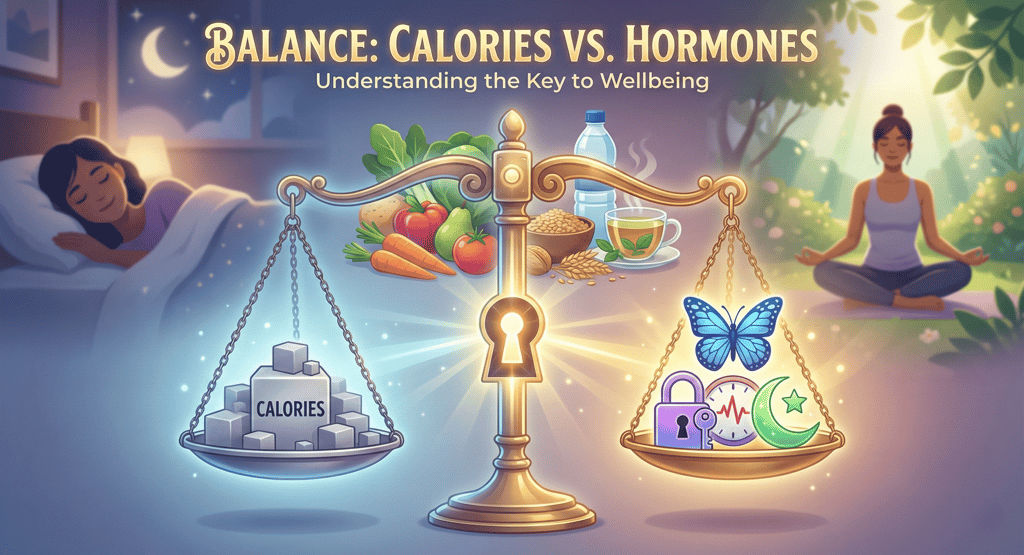Balancing Hormones: The Hidden Key to Weight Loss Beyond Calories
When it comes to weight loss, we've been taught that it's all about calories in versus calories out. But what if I told you that your hormones might be more important than counting every calorie? Let's dive into why hormone balance could be the game-changer you've been searching for on your weight loss journey.
Loraine Berriman
12/1/20243 min read


Your body is an intricate system where hormones act as messengers, controlling everything from your metabolism to where you store fat. Two hormones in particular take center stage in the weight loss conversation: insulin and cortisol.
Insulin regulates your blood sugar and directly impacts fat storage, especially around your midsection. When insulin is imbalanced, you might experience sugar cravings, irritability between meals, frequent urination, or thirst. These aren't just annoying symptoms, they're your body's way of telling you something's off.
Cortisol, often called the stress hormone, can lead to belly fat accumulation when chronically elevated. Signs of cortisol imbalance include cravings for salty foods, fatigue, dark under-eye circles, and being a night owl.
Why Calorie Counting Falls Short
The traditional calorie model treats your body like a simple math equation, but human biology is far more complex. As nutrition researcher Dr. Makoto Trotter points out, "When scientists determine calories in food, they burn it in an oven, but an oven is not a human body."
This explains why some people can eat 3,000 calories daily without weight gain while others struggle on just 1,000 calories. The truth is, you can track what goes in your mouth, but you can't precisely measure how your unique body uses those calories.
Balancing Insulin is Your Your First Priority
To balance insulin, focus on these strategies:
Getting at least seven servings of vegetables daily (a serving is about a handful).
Consuming three servings of quality protein like meat, fish, or seafood.
Including 30 grams of fiber from sources like flax seeds, chia seeds, or hemp seeds.
Prioritizing strength training to build muscle, which improves insulin sensitivity.
These approaches have shown remarkable results, with some people losing significant fat from problem areas in just weeks.
Your Stress Response
For cortisol management, try the following strategies:
Prioritizing sleep between 11 p.m. and 9 a.m., which is especially restorative.
Engaging in gentle exercise like walking, yoga, or tai chi rather than intense workouts.
Identifying and eliminating food sensitivities, which can trigger cortisol release.
Using anti-inflammatory herbs like turmeric, cinnamon, and ginger.
Other Hormonal Factors
Once insulin and cortisol are regulated, other hormonal imbalances often resolve themselves. However, if you're still struggling with issues like estrogen dominance or testosterone imbalance, additional strategies can help:
Taking B-complex vitamins and zinc.
Including cruciferous vegetables like broccoli, cabbage, and kale.
Adding moderate amounts of coconut oil (if you don't have high cholesterol).
Using specific supplements for estrogen detoxification.
The Thyroid Connection
Thyroid issues can significantly impact your weight loss efforts. If you suspect thyroid problems, consider:
Supplementing with selenium, iodine, and tyrosine (if not caused by autoimmune conditions).
Detoxifying from heavy metals.
Including sea vegetables like dulse in your diet.
Going gluten-free and dairy-free if you have inflammatory symptoms.
A New Approach To Weight Loss
Instead of obsessing over calories, focus on creating hormonal balance. Listen to your body's signals. Are you constantly hungry? You might be exercising too much. Do you crave sugar intensely? Your insulin might need balancing.
As nutritionist Lori Kennedy notes, "Women in particular believe that when they drop calories, they lose fat faster, but what actually happens is the thyroid slows down and the adrenals tire out."
Food isn't the enemy, as your body needs proper nutrition to maintain hormonal balance, which naturally leads to a healthy weight. By shifting your focus from strict calorie counting to hormone optimization, you might find the sustainable weight loss approach you've been searching for.
Further reading on TheFitnessEdit.co.za: 'The Ultimate Guide to Losing Body Fat.'
You can also read about: 'The Hidden Key to Weight Loss Beyond Calories.'
The information provided in this blog post is intended solely for informational purposes. It is not meant to replace professional medical advice, diagnosis, or treatment. Consult health care providers for personalised medical advice and treatment options related to specific health concerns.
About The Author
Loraine is an International Personal Trainer certified through Trifocus Fitness Academy (South Africa). She believes fitness should be accessible to everyone, regardless of age or starting point, and focuses on creating programs that fit real lives, not the other way around.
© 2026 Elevate Wellness Co. Pty Ltd. All rights reserved


